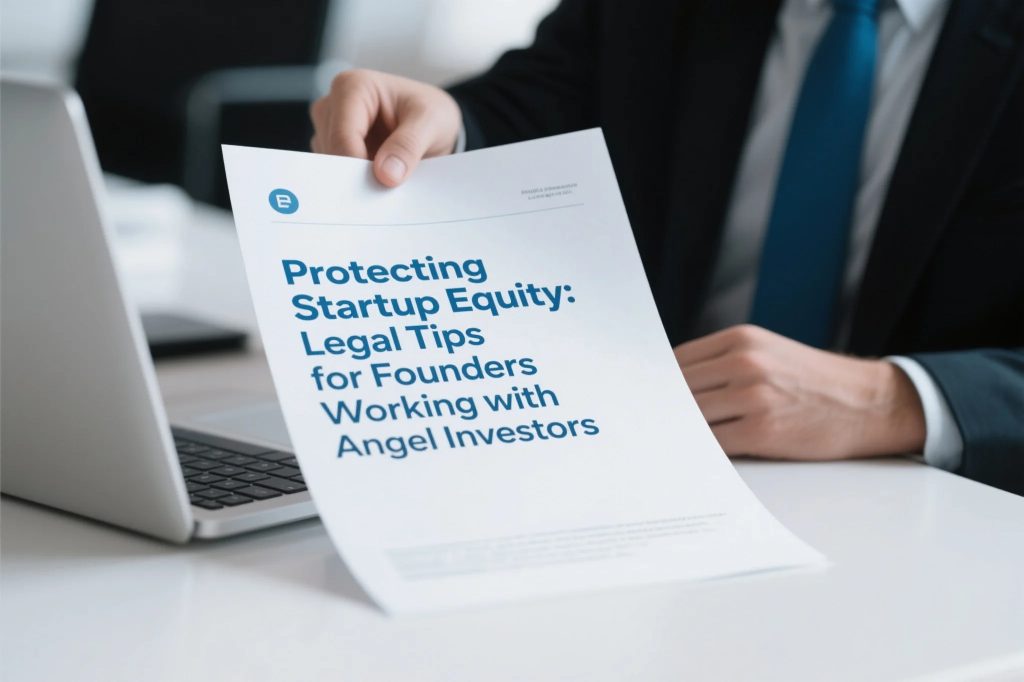Understanding the importance of safeguarding your startup’s ownership
When launching a new venture, one of the most critical yet often overlooked aspects is startup equity protection. Many enthusiastic founders focus primarily on product development and customer acquisition while neglecting the legal framework that preserves their hard-earned ownership. The early stages of a business are particularly vulnerable because this is when founders make crucial decisions about distributing shares that can have lasting consequences. Equity represents not just current value but future potential, making it essential to approach its allocation with careful consideration and proper legal safeguards.
The relationship between entrepreneurs and angel investor legal contracts creates a complex dynamic where both parties seek to maximize their positions. Founders want capital and expertise without surrendering too much control, while investors want substantial returns on their high-risk investments. This delicate balance makes the initial equity arrangements fundamental to the company’s long-term stability. Many promising startups have failed not because of poor products or lack of market demand, but due to equity disputes that fractured the founding team or diluted the original vision beyond recognition.
Proper legal advice for new business operations can mean the difference between maintaining control of your company and watching helplessly as decision-making power slips away. The challenge lies in understanding which elements of equity distribution require ironclad agreements and which areas allow for flexibility as the business evolves. Founders must recognize that equity protection isn’t about being distrustful of investors—it’s about establishing clear rules that benefit all stakeholders while preventing misunderstandings that could derail the company’s progress.
Essential legal documents every founder should implement
The foundation of robust startup equity protection begins with properly drafted legal documents that anticipate various scenarios. The shareholder agreement stands as the cornerstone of these protections, outlining rights, restrictions, and procedures for equity transfers. This contract should address what happens if a co-founder leaves, how new investors can join, and what mechanisms exist for dispute resolution. Many founders make the mistake of using generic templates found online, not realizing that these often lack the specific provisions needed for their unique business situation and growth trajectory.
When dealing with angel investor legal contracts, the term sheet represents the first significant legal document in the relationship. While term sheets are typically non-binding regarding the investment itself, they establish the framework for all subsequent agreements. Key elements like valuation, option pools, liquidation preferences, and anti-dilution provisions get established at this stage. Founders often underestimate how these early terms can affect their ownership percentages several funding rounds later. Professional business formation services can help navigate these complex documents to ensure fair terms that don’t overly restrict the company’s future options.
Vesting schedules constitute another critical component of startup risk coverage that founders frequently neglect in the early excitement. Implementing a four-year vesting period with a one-year cliff for all founders and early employees prevents situations where team members leave prematurely with large equity stakes. This mechanism aligns everyone’s interests with the company’s long-term success. Similarly, buy-sell agreements provide predetermined solutions for equity redistribution when certain triggering events occur, such as death, disability, or departure of a founder. These documents might seem unnecessary during the optimistic early days, but they become invaluable when facing real challenges.
Navigating investment terms that impact equity distribution
Understanding how different investment terms affect your ownership requires grasping some complex financial concepts that have direct implications for startup equity protection. Valuation caps on convertible notes, for instance, might seem attractive when they result in higher valuations during seed rounds, but they can lead to significant dilution during subsequent financing. Participating preferred stock is another term that can dramatically alter equity outcomes during exit scenarios, sometimes leaving founders with far less than anticipated despite the company’s success.
The world of angel investor legal contracts contains numerous provisions that appear standard but warrant careful negotiation. Pro-rata rights, which allow early investors to maintain their ownership percentage in future rounds, can either help or hinder a startup depending on the circumstances. Drag-along and tag-along rights determine what happens during acquisition scenarios, potentially forcing minority shareholders to sell against their wishes or guaranteeing they can participate in lucrative exits. Founders seeking legal advice for new business ventures should pay particular attention to these clauses as they shape the company’s future fundraising landscape.
Anti-dilution provisions represent one of the most consequential elements in startup risk coverage, particularly for founders. While investors legitimately want protection against future down rounds, the type of anti-dilution mechanism chosen (full ratchet vs. weighted average) can have vastly different impacts on founder equity. These provisions illustrate why founders need to think several moves ahead, anticipating how current decisions will play out across multiple funding rounds and potential valuation fluctuations. Comprehensive business formation services typically include analysis of these scenarios to help founders make informed choices.

Common pitfalls that jeopardize founder equity positions
Many founders unintentionally undermine their own startup equity protection through avoidable mistakes made during the formative stages. One frequent error involves distributing equity too generously to early advisors or team members without proper vesting schedules or performance milestones. What begins as motivational generosity can transform into an anchor dragging down future fundraising efforts when too much equity sits with inactive parties. Another common misstep occurs when founders fail to account for the option pool when calculating their ownership percentages, leading to unpleasant surprises when the pool gets created prior to a funding round.
The negotiation of angel investor legal contracts presents another minefield where founders often concede too much ground. In their eagerness to secure funding, some entrepreneurs agree to liquidation preferences that give investors disproportionate returns before founders receive anything. Multiple liquidation preferences (2x or 3x) can make it nearly impossible for founders to benefit meaningfully from exits unless the company achieves extraordinary success. Seeking proper legal advice for new business ventures before signing these agreements helps maintain reasonable terms that keep founders motivated to grow the company.
Founders frequently underestimate how personal financial decisions can affect their startup risk coverage and equity position. Personal guarantees on business loans, for instance, might seem necessary to secure early funding but can lead to situations where founders sacrifice equity to settle personal obligations. Similarly, messy capital structures with multiple types of securities (common stock, various series of preferred stock, warrants, etc.) can make future fundraising prohibitively complex or expensive. Professional business formation services often recommend cleaner structures that provide flexibility for future growth while protecting founder interests.
Strategic approaches to maintaining meaningful ownership
Effective startup equity protection requires more than just defensive measures—it demands proactive strategies that align with the company’s growth trajectory. One powerful approach involves implementing dynamic equity models that adjust allocations based on ongoing contributions rather than relying solely on initial distributions. These models can prevent the common scenario where early contributors retain disproportionate ownership despite reduced involvement as the company scales. Another strategic consideration involves carefully planning equity reserves for future hires, ensuring the company can attract top talent without constant dilution of existing stakeholders.
When engaging with angel investor legal contracts, founders should consider structuring investments in ways that minimize unnecessary dilution. Convertible instruments like SAFE (Simple Agreement for Future Equity) notes can sometimes provide early funding without immediately establishing valuations that might disadvantage founders. However, these instruments come with their own complexities and potential pitfalls, particularly regarding valuation caps and discount rates. Savvy founders combine these tools with traditional equity rounds in sequences that optimize ownership retention while still attracting necessary capital.
The quest for comprehensive startup risk coverage should include regular legal health checks as the company evolves. What made sense during the seed stage might become problematic during Series A or B rounds. Founders should reassess their cap table, investor rights, and equity arrangements before each major funding event rather than waiting until problems emerge. This proactive approach allows for course corrections while the company maintains stronger negotiating positions. Quality business formation services often provide these ongoing assessments as part of their value proposition to startup clients.
Building investor relationships that support founder vision
While startup equity protection focuses on legal safeguards, the human element of investor relationships plays an equally crucial role in preserving founder interests. Selecting investors who align with the company’s vision and values reduces the likelihood of future conflicts over equity and control. Founders should view investor due diligence as a two-way process, evaluating potential backers’ track records with other portfolio companies regarding founder treatment during challenging periods. The best angel investor legal contracts can’t compensate for fundamentally misaligned expectations between founders and their financial partners.
Transparent communication forms the bedrock of healthy founder-investor dynamics that complement formal legal advice for new business arrangements. Regular updates that go beyond mandatory reporting help build trust and demonstrate competent management, making investors less likely to demand excessive control provisions during difficult periods. Founders who cultivate these relationships often find more flexibility when needing to renegotiate terms or extend timelines. This goodwill becomes particularly valuable during bridge rounds or down markets when standard contract terms might otherwise force unfavorable decisions.
The interplay between formal startup risk coverage mechanisms and informal relationship management highlights why successful founders develop both legal and emotional intelligence. While contracts define the boundaries of the relationship, the day-to-day interactions determine how those boundaries get interpreted when unexpected challenges arise. Professional business formation services increasingly recognize this dual need, offering not just legal documentation but also guidance on investor communication strategies that preserve founder equity while maintaining positive partnerships.
Planning exit scenarios that honor founder contributions
Many discussions about startup equity protection focus appropriately on the early and growth stages, but wise founders also consider how equity arrangements will play out during potential exits. Acquisition scenarios often reveal flaws in equity structures that seemed workable during fundraising rounds. Earn-outs, for instance, might promise additional compensation based on performance metrics but frequently result in disputes or unpaid amounts. Founder shares without proper acceleration provisions can leave departing leaders with nothing after years of building value. Thoughtful angel investor legal contracts address these scenarios in advance rather than leaving them to last-minute negotiations.
The complex tax implications of various exit scenarios further complicate startup risk coverage planning. Different equity structures (common stock, incentive stock options, non-qualified options, etc.) carry vastly different tax consequences during liquidity events. Founders who neglect these considerations during early-stage equity grants might face surprising tax liabilities that significantly reduce their net proceeds. Specialized legal advice for new business ventures should include tax planning that aligns with the founder’s long-term financial goals and potential exit timelines.
Ultimately, comprehensive business formation services recognize that protecting founder equity isn’t just about preserving percentages—it’s about ensuring those percentages translate into meaningful outcomes when the company succeeds. This requires forward-looking planning that considers multiple potential exit paths, market conditions, and the evolving regulatory landscape. Founders who invest time in understanding these dimensions during the company’s formative stages position themselves to reap the full rewards of their innovation and effort when the opportunity for liquidity arises.





